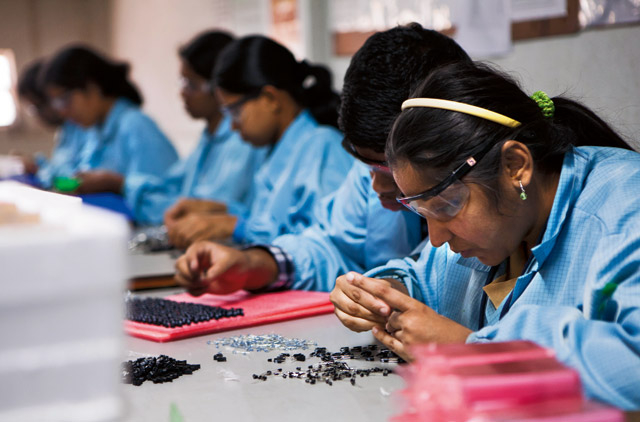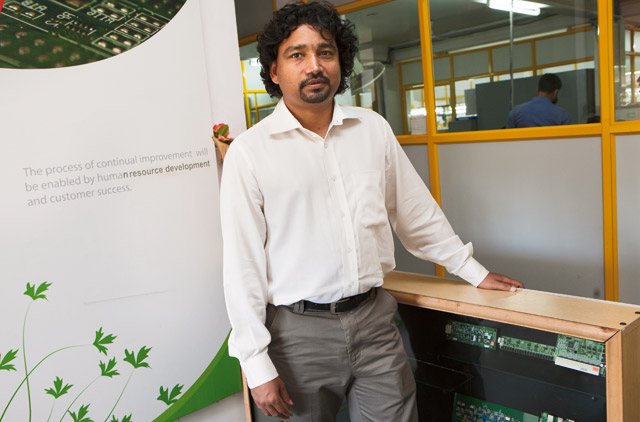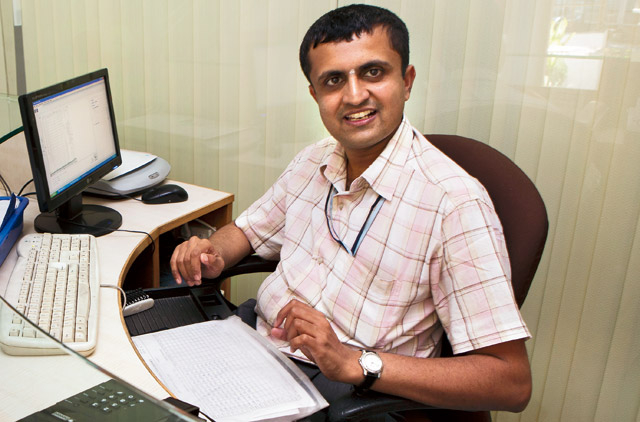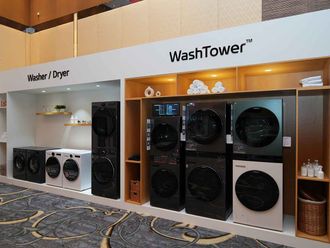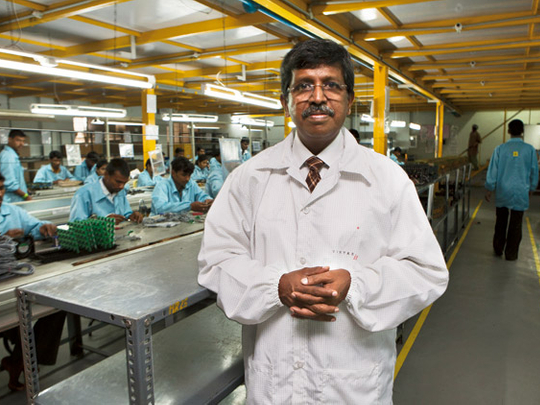
Sunil (name changed), who works in marketing at Vinyas, an electronic component manufacturing unit in Mysore, India, was in a fix. It was an extremely busy day for him and he wanted to put off a meeting he had scheduled with a client. So he did what many do routinely; he requested Ram Aiyappa, the office receptionist, to inform the client when he arrived that he (Sunil) was away on an urgent assignment.
"But how can I tell the client that you are not in office when you are here?'' asked Ram.
"Just tell him that I have gone out,'' said Sunil.
"But how can I say that when you have not gone out?'' countered Ram.
Exasperated Sunil gave up and decided it was easier to just meet the client.
"Ram is an honest, simple and absolutely lovable guy,'' says N. Narendra, Managing director of Vinyas Innovative Technologies Pvt Ltd. "He will only speak the truth because he doesn't know what a lie is.''
Ram, a special needs youth, is one of the most important people in Vinyas and Narendra is proud to have him in his office. "It's a good thing to have such a person in my company,'' he says. "When my front office is truthful, the back office will soon catch up. So transparency in my organisation is now a default option."
Inspired by his father
Founded in 2001 by a group of technocrats, Vinyas offers a slew of services to the engineering manufacturing and services industry. Its client list includes Crane Aerospace & Electronics, Dubai Technologies, Phillips, Texas Instruments, Tata and Infosys.
But what really sets this little-known firm apart is that it employs special needs people in various areas of the company. At the moment, there are nine special needs people in an employee list of 600.
"A lot of what I do today in the company with regards to special needs people is thanks to the lessons I learnt from my father HS Narayanan,'' says Narendra. "A psychiatrist who practised at NIMHANS, (National Institute of Mental Health and Neuro Sciences) Bengaluru, my father impressed upon us that such people could easily join the productive workforce if they were given opportunities appropriate for their skill range at a young age.''
So when Narendra and his team set up Vinyas, he was keen to do his bit to help special needs youths. "A few years after we set up, Sambhav Foundation, an NGO from Bangalore, requested us to include a few mentally challenged students in our work force.''
Narendra agreed and Sambhav conducted a pilot study to identify areas where special youths could work.
"Before we went ahead I had a talk with my then 100-plus employees and told them we are taking on board these special employees; that they may be a little slow to learn the processes; that we would treat them humanely and that they would be a valued part of our organisation. The staff members said they would gladly take care of them."
Was it difficult to take such a major decision?
"I was scared about the step we were taking,'' Narendra admits. "The business risk was proportionately small because they were only eight in number and initially we gave them only low-value items to work on. But my main fear was for the students: would our well-intentioned effort to integrate them into the mainstream workforce affect them adversely?"
To ensure a smooth transition and continued counselling, Vinyas persuaded Raghavendra Madhyastha, Sambhav Foundation's special trainer, to join them as on-site counsellor.
Narendra's fears were unfounded. Only one of the initial eight dropped out. Two more have joined in the past two years and Narendra has made it mandatory that the company would take in one special needs student every year.
Today, it is obvious that Madhyastha's strong rapport with the special team helps to bring out the best all around. While physically their growth is commensurate with their chronological age and they undergo similar physiological/hormonal changes that people their age go through, the mental abilities of the special needs youths are similar to those of children between the ages of six and seven.
"Like any six-year-old they are innocent. They do not understand sarcasm. Emotionally they are extremely sensitive and have not acquired filters to deflect their anger or hurt.''
A psychiatrist visits the company every month to evaluate the special employees. All the differently abled youngsters are on mild medication, some for epilepsy and others to boost immunity, which is particularly low among Down's syndrome children. "Sometimes, when they are feeling a bit upset, they may refuse to work. They will just sit in their chair with their arms folded across their chest - just like a six or seven-year-old," says Narendra.
"This happens may be once in three months. Then either Raghavendra, Umesh [the general manager] or I will tell them, ‘Come on, we have to get back to work' in a firm voice and they are happy to get back to work.
"I allow these employees open access to my office at any time. They are free to complain about anyone or anything that they are unhappy with. And when that happens, all it takes is a reassuring word or a patient hearing to get them back on track."
Masters of their trade
The day I visited Vinyas, I found the special employees deep in concentration on their tasks. Two of them, Sandhya and Nishanth (the special needs staff preferred to use only their first names) were working on the lead bases of the electronic components, while Dilip and Sandeep who sit next to each other were engaged in stacking LCDs in boxes. As soon as one box gets filled, they close the boxes, secure it with tape and move it into the storage area.
Seeing them working, I'm reminded of Madhyastha's statement that the moot difference in their skill sets is that although they cannot multi-task they bring great efficiency to repetitive tasks by learning the action and practising it repeatedly.
Their work profile at Vinyas calls for strong eye-hand coordination skills. At Sambhav Foundation, part of their pre-Vinyas joining orientation consisted of filling up match boxes with matches, emptying them out and filling them again. This has helped to improve their motor coordination skills. "It was unbelievable how determined they were to succeed at their job," says Madhyastha.
"I remember how Nishanth cut his finger in the LED cutting machine the very first day and it bled a little. But he put up a brave front ignoring the pain and bleeding because he was keen to prove himself as a worthy employee."
Narendra says the concern regarding quality was raised by TUV, the body for auto electronics manufacture audit known as the TS audit.
"When they knew of our special employees they said they wanted to check samples. They picked up 25 per cent - which is a huge sample when the total size is only a few hundred spare parts. They found nothing wrong in it but they then wanted to see 50 per cent of the samples. There was nothing wrong with this either so eventually they checked 100 per cent production and they found the quality was good.
"By this time they had begun to feel a little guilty for having these doubts regarding the special employees' work. They then went over to the group and congratulated the staff."
One of the auditors asked Nishanth what else he could do? The boy innocently answered, "I can sing and dance as well." The man then asked him, "Can you sing a song for me?' Without batting an eyelid Nishanth told him, "I'm working. Please do not disturb me now. Can you come later?"
The auditor was amazed. He took a picture of Nishanth during the lunch break and said, "He has truly reminded me of a very important lesson: that an auditor should ask questions pertinent only to the audit."
Striving for excellence
Coincidentally, Ali Moidu, Chief Operating Officer, Dubai Technologies, was visiting Vinyas the day of my meeting and I heard first hand what he feels about this initiative.
"The warm interaction with Vinyas begins from the reception. I have seen the entire team of specially abled people work with quiet concentration and what struck me was that they consciously strive for quality excellence.
"Many corporates are engaged in CSR activities but this effort goes beyond that because Narendra and Vinyas have shown that the differently abled are on par with regular employees in their productive contribution to the company. I get the message that it is possible to integrate these young people into the mainstream workforce for profit, not only for charity," says Moidu.
In addition to their motor-visual skills their interpersonal communication abilities are excellent, says Narendra. "If I'm coughing, they will ask ‘why are you coughing?', ‘Did you go to the doctor?'," says Narendra.
Compensation packages for the specially abled at Vinyas are on par with the rest of the staff as are their annual increments. But that said, they still are yet to learn the value of what they earn. For instance, on pay day the special staff will often say, "I will spend my salary on ice creams and soft drinks."
What is interesting is that the special needs children come from various strata of society. For instance, Dilip's mother works as a house maid while Nishanth's father is a builder in the city. But Nishanth is very proud of the money he earns by his own efforts. "I remember him once saying ‘[I can now buy a coke] with my own money'. That is the innocent pride they take in being able to pay for their own needs."
Vinyas has an annual turnover of $12 million. It is now in talks for bringing in a private equity partner. And in order to make sure the initiative of employing differently abled young adults is carried on even with a private equity partner coming in Narendra and his wife Meera are forming a Trust with other like-minded people.
Does Vinyas have a message to parents who would like to see their differently abled children gainfully employed?
Madhyastha's advice to parents is to train them well on a continuing basis on basics such as how to use public transport, how to buy a bus ticket and teach them money concepts. "That will stand them in good stead,'' he says.
- Who: Vinyas
- Where: Mysore, India
- What: An electronic component manufacturing unit that employs people with special needs
Tell us the story…
Do you know of an individual, a group of people, a company or an organization that is striving hard to make this world a better place? Emails us at friday@gulfnews.com or the pages editor at araj@gulfnews.com


